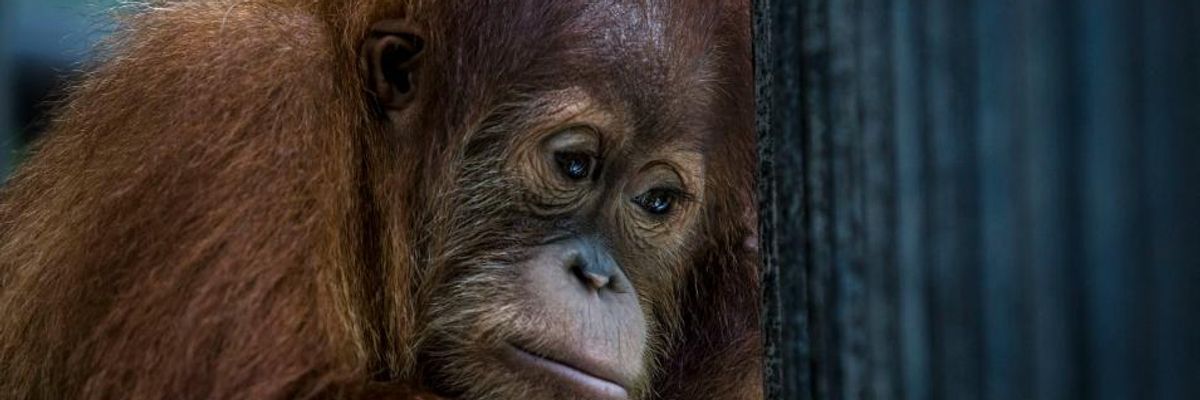"Humanity's broken relationship with nature comes at a cost."
That cost is new zoonotic diseases, which are passed from animals to humans and "are emerging at an alarming rate." That is according to a World Wide Fund for Nature (WWF) report released Wednesday as the coronavirus pandemic continues to devastate communities and economies across the globe.
The report, entitled Covid-19: Urgent Call to Protect People and Nature (pdf), issues a call for global action "to reduce the risk of future pandemics and heal our broken relationship with nature," detailing specific moves that governments, companies and industries, civil society organizations, and the public should take to help create a healthier world.
"The increased emergence of zoonotic diseases," the report explains, "is linked to two widespread environmental risks."
- Driven by unsustainable food systems, the large-scale conversion of land for agriculture is increasing interactions between wildlife, livestock, and humans. Land conversion is destroying and fragmenting forests and other natural habitats around the world, resulting in higher levels of contact between wildlife, livestock, and humans. This problem is only set to worsen as the challenge of feeding a growing population increases and diets shift.
- Poor food safety standards, including permitting the trade and consumption of high-risk wildlife species, are increasing human exposure to animal pathogens. Globally, demand for wild meat is growing, as either a delicacy or a necessity, driving increased sale and consumption, and increasing the potential for exposure to diseases during high-risk sourcing, handling, and preparation practices.
Given the increased emergence of such diseases and the threats pandemics pose to health, economies, and global security, the report treats the current Covid-19 crisis as a signal to the international community that rapid "systemic changes must be made to address the environmental drivers of pandemics."
As WWF International director general Marco Lambertini put it in a statement Wednesday: "We must urgently recognize the links between the destruction of nature and human health, or we will soon see the next pandemic."
"We must curb the high risk trade and consumption of wildlife, halt deforestation and land conversion, as well as manage food production sustainably," said Lambertini. "All these actions will help prevent the spillover of pathogens to humans, and also address other global risks to our society like biodiversity loss and climate change."
"There is no debate, and the science is clear; we must work with nature, not against it," he said. "Unsustainable exploitation of nature has become an enormous risk to us all."
Along with commenting on his group's new report, Lambertini on Wednesday co-authored a related op-ed in the Guardian with Elizabeth Maruma Mrema, executive secretary of the United Nations Convention on Biological Diversity, and Maria Neira, director of the World Health Organization (WHO) department of environment, climate change, and health.
As of Wednesday afternoon, there were more than 8.2 million confirmed Covid-19 cases and over 444,000 deaths worldwide. The trio put the pandemic into a broader context:
We have seen many diseases emerge over the years--such as Zika, Aids, Sars, and Ebola--and although they are quite different at first glance, they all originated from animal populations under conditions of severe environmental pressures. And they all illustrate that our destructive behavior towards nature is endangering our own health--a stark reality we've been collectively ignoring for decades. Research indicates that most emerging infectious diseases are driven by human activities.
The op-ed's authors echoed WWF's calls to reform global food systems and stop destroying natural habitats, and endorsed demands that governments and international bodies have faced throughout the pandemic, writing that "we must embrace a just, healthy, and green recovery, and kickstart a wider transformation towards a model that values nature as the foundation for a healthy society, and a well-resourced and equitable economy."
"This means shifting to more sustainable practices, such as regenerative and diversified agriculture and diets, sustainable animal farming, green urban spaces, and clean forms of energy," they continued. "Not doing so, and instead attempting to save money by neglecting environmental protection, health systems, and social safety nets, has already proven to be a false economy. The bill will be paid many times over."
Lambertini, Mrema, and Neira expressed hope that the U.N. biodiversity summit currently scheduled for late September will serve as an opportunity for world leaders to "signal their support for a new relationship with our natural world" and "accelerate action through to next year when they are scheduled to take critical decisions on the environment, climate, and development."
The WWF report and op-ed follow a series of similar demands to reform humanity's relationship with nature on and leading up to World Environment Day earlier this month. Activists, scientists, policymakers, and other global figures declared that "the emergence of Covid-19 has underscored the fact that, when we destroy biodiversity, we destroy the system that supports human life."
In a webinar about pandemics, wildlife, and intensive animal farming a few days before World Environment Day, primatologist and conservationist Jane Goodall warned of the dire consequences of failing to overhaul unsustainable global food systems and end the destruction of nature. "If we do not do things differently, we are finished," she said. "We can't go on very much longer like this."
